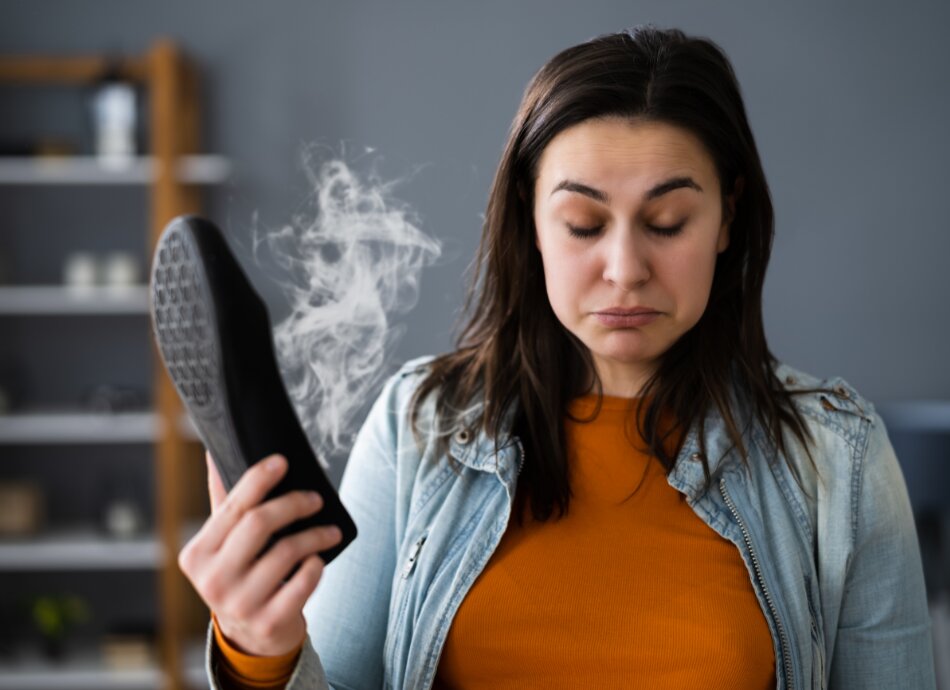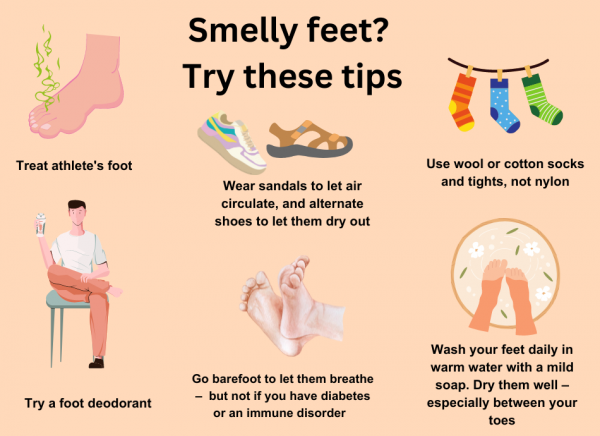Foot odour
Also called smelly feet and bromodosis
Key points about foot odour
- Most people experience smelly feet now and again, but for some people it can be an ongoing and embarrassing problem.
- Smelly feet are usually caused by a build-up of sweat and bacteria.
- When sweat is trapped in your shoes or socks, it can create a bad smell.
- Bacteria that live off the sweat can also cause foot odour.
- Another cause of smelly feet is a fungal infection such as athlete’s foot.
- In most cases, smelly feet are easy to treat.

Foot odour is another term for having smelly feet. Although we all have smelly feet from time to time, especially if our feet have got hot and sweaty, some people find it's an ongoing problem.
Foot odour may be caused by the bacteria that live off the sweat on your feet. You may also have smelly feet if you have a fungal infection such as athlete's foot.
Causes of smelly feet include:
- Not washing your feet daily.
- Wearing the same shoes every day or not changing them often.
- Wearing shoes that are too tight so that sweat can't evaporate, or shoes that are made of 'unbreathable' material (eg, plastic).
- Stressful situations that cause you to sweat more.
- Standing for a long time.
- Being overweight.
- Some medicines, eg, antidepressants.
- Hot weather.
- Exercise.
- Hormonal changes in your body (especially for teenagers and pregnant women).
- A fungal infection such as athlete's foot between your toes.
- A condition called hyperhidrosis, which makes you sweat far more than usual.
In most cases, smelly feet are easy to treat. Always aim to keep your feet clean and dry, and make sure you pay attention to the area between your toes.
Wash your feet with an anti-bacterial soap or a mild, antiseptic solution, every day for about a week. Dry your feet well, before putting on clean socks or shoes. This usually reduces the amount of bacteria on the feet.
If you have itchy patches between or on your toes, which may blister or have a rash, you may have a fungal infection like athlete's foot. Talk to your pharmacist about using an antifungal product to get rid of the infection.
If the cause of your smelly feet is excess sweating, talk to your healthcare provider who might suggest a special antiperspirant. A treatment called iontophoresis might also help with sweating. This involves passing a weak electrical current through the skin. Read more about iontophoresis(external link).
Your healthcare provider might also suggest you see a podiatrist (foot specialist) if you need further help.

Image credit: Healthify He Puna Waiora
Foot care
Good foot care or foot hygiene is very important in preventing smelly feet.
- Wash your feet daily with soap and warm water and dry thoroughly – especially between your toes.
- Keep your toenails short and clean.
- Remove hard skin from the soles of your feet – it can become soggy when damp, becoming a place for germs (bacteria) to grow.
- Soak your feet for up to 20 minutes once a week to give them a good, deep clean. You can mix ½ a cup of Epsom salt into warm water or mix 2 parts of warm water with 1 part apple cider or white vinegar.
- When you’re at home, spend time with your bare feet out in the fresh air. Note this is not recommended for people with diabetes or a suppressed immune system.
Footwear
- Wear fresh socks every day. Wear cotton or woollen socks and avoid wearing nylon socks.
- Avoid wearing the same pair of shoes 2 days in a row. Instead, alternate your shoes daily to allow them to dry out.
- Wear leather or canvas shoes that allow your feet to 'breathe'. Avoid plastic shoes.
- If you use your canvas or sports shoes very often, machine wash them and dry them out thoroughly every now and again.
- If you wear insoles, air them out every day to help reduce foot odour.
- Use a disinfectant spray on your shoes and let them air dry.
- Wear open-toed sandals in summer.
- Avoid tight-fitting shoes. Choose a shoe size and style that allows air to circulate eg, sandals and open-toed shoes.
Foot and footwear products
- Use an antiperspirant spray or foot powder on your feet. These products reduce sweating from the sweat glands on the soles of your feet.
- Examples include Gran's Remedy, Neat Feet spray-on or roll-on, Odorex or aluminium chloride foot products.
- An antifungal laundry solution like Canesten can be added to your wash to help get rid of bacteria and fungi in your socks and sports gear.
- Use surgical spirit as long as the skin's not broken. It can be bought from your pharmacy.
- Apply following a bath or shower (make sure you have dried your feet well with a towel) by dabbing cotton wool dipped in surgical spirits between your toes.
Generally, the treatment and prevention mentioned above will help you manage smelly feet. However, some people have an ongoing foot odour problem that affects their daily life. If this is the case, it's a good idea to see your healthcare provider or podiatrist.
It is also best to see your healthcare provider if you have other conditions such as diabetes, peripheral neuropathy or peripheral arterial disease. This is because excessive sweating can put your feet at risk of a foot infection leading to more serious conditions such as a skin infection (called cellulitis) and ulceration.
Find a local podiatrist(external link) Podiatry NZ
How to treat and prevent smelly feet(external link) yourself NHS, UK
References
- Iontophoresis(external link) DermNet, NZ, 2015
- Smelly feet(external link) NHS, UK, 2022
- What to know about smelly feet(external link) WebMD, US, 2021
- Sweaty feet(external link) NHS, UK, 2022
Credits: Healthify editorial team. Healthify is brought to you by Health Navigator Charitable Trust.
Last reviewed:
Page last updated:





